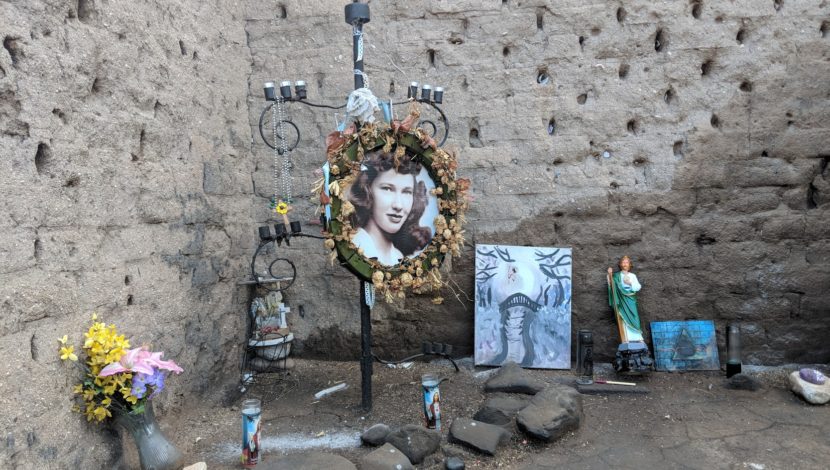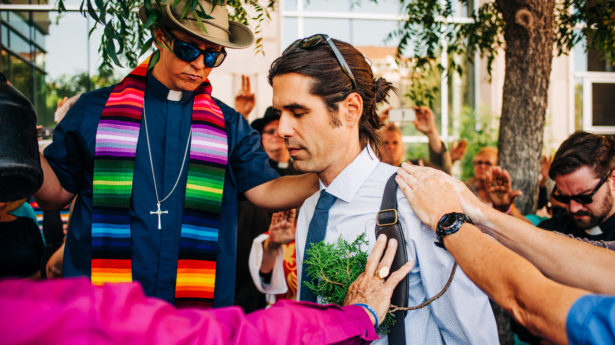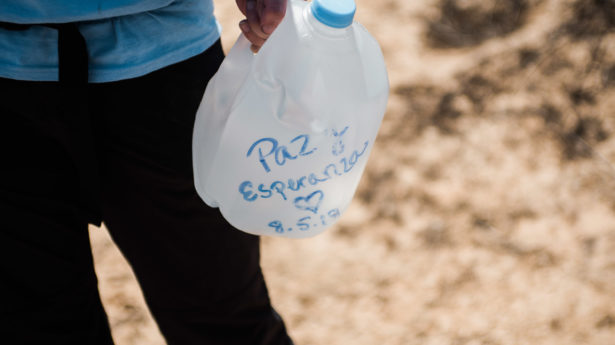The Unitarian Universalist Service Committee advances human rights through grassroots collaborations.
“No Estas Solo” (You Are Not Alone): Reflections from the Desert

By on November 7, 2019
I knew the water drop in the desert was going to be difficult. I thought I was prepared for the heat and the sun. I had on a sun hat, long sleeves, prescription sunglasses, new but broken-in hiking boots, and what felt like a second skin of sunscreen. I was far less prepared for the rocky terrain and the large, thorny plants that offered some shade but also made it difficult to keep your bearings. I was not prepared for the ants that would bite at your feet and climb up your legs if you should stand in one place for too long or, heaven forbid, sit down. I wasn’t prepared for the wasps with bodies the size of my finger hovering as we set jugs of water at trail crossroads (I later learned that these wasps are called Tarantula Hawks). But more than anything, I was not prepared for how beaten down I would feel in the desert. The exhaustion that sets in is as emotional and spiritual as it is physical.
The organization No Más Muertes (No More Deaths) has been traveling into the inhospitable border lands between Arizona and Mexico for more than a decade to leave water and food for migrants making this treacherous journey. Alongside 10 others, I joined a group of Unitarian Universalists on a trip into the Arizona desert, which is organized routinely by the UU College of Social Justice, BorderLinks, and No More Deaths.
This experience gives participants a small taste of what migrants from Central America endure to come to the United States. Since the mid-1990s, the United States has employed an immigration policy the government calls “prevention through deterrence.” Increasing restrictions on and militarizing populated areas along the U.S.-Mexico forces migrants to attempt travel through the inhospitable and often deadly mountainous desert landscape — a stretch of more than 2,000 miles along the southern U.S. border. Approximately 9,000 migrants are believed to have perished through the “prevention through deterrence” policy since it was implemented in 1994. This number is approximate because most migrants reported missing by their families in Central America are never found. They are disappeared. No More Deaths has helped recover the remains of more than 3,000 people in the Sonora desert, however. Make no mistake, these deaths are part of U.S. immigration policy. These deaths are an intentional and integral part of “prevention through deterrence.”
Difficult as it was, our trip into the desert was a pleasant stroll compared to the days or weeks migrants face in the desert, almost always with far fewer provisions than we had with us. We had an experienced guide with us. We were hiking only a few miles on public land. Our light skin, flat accents, and U.S. passports meant that our questioning by border patrol agents was brief and perfunctory. Still, our journey had moments of real fear. A member of our group fell as we reached the top of the first rocky hill. We had a first aid kit and were able to clean and bandage the many cuts and scrapes. The plants as well as the rocks here seem designed to draw blood. More slips, more falls. The unstable, rocky inclines made keeping my footing a near impossible task.
Eventually, we reached the crossroads where two trails met. We placed the canned beans we brought into a lidded plastic bucket labeled “comida” (food). We placed the gallon jugs of water we carried next to a few others which were already there. One of these jugs had a short message on it written in black sharpie. “No Estas Solo” (You Are Not Alone).
Beautiful and deadly, the desert teaches its lessons with a quick certainty. It teaches you the vitality of water and the importance of food. It shows you what it means to rely on community and require compassion. Without these things, you will not survive.
The sun was nearing its zenith and the temperatures were skimming 100 degrees as we turned back. Those who were steadier on their feet walked beside those who were less so. Any progress that was made as a group was due to teamwork and communication. We discussed how to ascend or descend each hill, step by difficult step. We asked for what help we needed. We encouraged each other with song. We prayed with our words, our hands, and our feet. Four hours after entering the desert, we emerged. Bloodier, thirstier, and, hopefully, wiser than when we went in. The water from the van cooler was indescribably sweet. The peanut butter sandwich I ate was the most delicious I have ever had.
After getting this brief introduction to desert travel, I cannot fathom choosing to make such a journey lasting days or weeks for any other reason except desperation. The amount of courage and grit required to do so is astounding. It gave me enormous admiration for the people who attempt this crossing. My sorrow is also enormous. That living conditions in some countries are so dire that a person would risk such a journey is a hard truth to bear. And, yet, here we are.
Physically confronting the life-and-death stakes involved makes the prosecution of No More Deaths volunteer Scott Warren even more outrageous, in my mind. He is facing a lengthy prison sentence for offering humanitarian aid in the form of food, shelter, and medical care to two people who crossed the desert from Central America. Warren’s first trial ended with a hung jury, but the state decided to retry him for the “crime” of helping people who desperately needed it. As Warren’s retrial begins again on November 12, I have a new appreciation for the life-saving work that No More Deaths provides every day. I also have new appreciation for the depths of cruelty at the root of U.S. immigration policy.
Humanitarian aid is not a crime. Migration is a human right. Asylum is a human right. These are the values UUSC and our partner No More Deaths put into action. Values being exemplified by Scott Warren now as he continues to fight these felony charges for displaying human compassion. As people of conscience, we will continue to advocate for the human rights of migrants. We will continue to be in solidarity with Scott Warren and others persecuted for providing humanitarian aid. We can only do this together. Thank you for being with us on this journey. Remember, no estas solo.
Photo Credit: Rev. Laura Randall, UUSC
***
About UUSC: Guided by the belief that all people have inherent worth and dignity, UUSC advances human rights globally by partnering with affected communities who are confronting injustice, mobilizing to challenge oppressive systems, and inspiring and sustaining spiritually grounded activism for justice. We invite you to join us in this journey toward realizing a better future!

